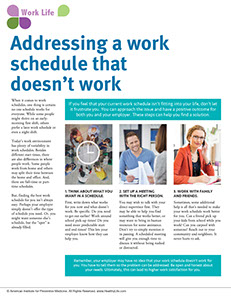SYMPTOM CHECKER
CONDITIONS
Male
Female
Child
Arm, Hand & Shoulder Concerns
Legs & Feet Concerns
Dental & Mouth Concerns
Ear & Nose
Eye Conditions
Head Conditions
Arm, Hand & Shoulder Concerns
Legs & Feet Concerns
Front
Back
Arm, Hand & Shoulder Concerns
Dental & Mouth Concerns
Ear & Nose
Eye Conditions
Head Conditions
Arm, Hand & Shoulder Concerns
Dental & Mouth Concerns
Ear & Nose
Eye Conditions
Head Conditions
Front
Back
Arm, Hand & Shoulder Concerns
Neck Links
Head & Neck Concerns
Arm, Hand & Shoulder Concerns
Neck Links
Head & Neck Concerns
Front
Back
Online Clinic
Wise Healthcare
Addressing a work schedule that doesn’t work
Print on Demand
When it comes to work schedules, one thing is certain: no one schedule works for everyone. While some people might thrive on an early-morning first shift, others prefer a later work schedule or even a night shift.
Today’s work environment has plenty of variability in work schedules. Besides different start times, there are also differences in where people work. Some people work from home and others may split their time between the home and office. And, there are full-time or part-time schedules.
But, finding the best work schedule for you isn’t always easy. Perhaps your employer simply doesn’t offer the type of schedule you need. Or, you might want someone else’s schedule, but the “spot” is already filled.
If you feel that your current work schedule isn’t fitting into your life, don’t let it frustrate you. You can approach the issue and have a positive outcome for both you and your employer. These steps can help you find a solution:
1. Think about what you want in a schedule. First, write down what works for you now and what doesn’t work. Be specific. Do you need to get out earlier? Work around school pick-up times? Do you need more predictable start and end times? This lets your employer know how they can help you.
2. Set up a meeting with the right person. You may wish to talk with your direct supervisor first. They may be able to help you find something that works better, or may want to bring in human resources for some assistance. Don’t try to simply mention it in passing. A scheduled meeting will give you enough time to discuss it without being rushed or distracted.
3. Work with family and friends. Sometimes, some additional help is all that’s needed to make your work schedule work better for you. Can a friend pick up your kids from school while you work? Can you carpool with someone? Reach out to your community and neighbors. It never hurts to ask.
Remember, your employer may have no idea that your work schedule doesn’t work for you. You have to tell them so the problem can be addressed. Be open and honest about your needs. Ultimately, this can lead to higher work satisfaction for you.
This website is not meant to substitute for expert medical advice or treatment. Follow your doctor’s or health care provider’s advice if it differs from what is given in this guide.
The American Institute for Preventive Medicine (AIPM) is not responsible for the availability or content of external sites, nor does AIPM endorse them. Also, it is the responsibility of the user to examine the copyright and licensing restrictions of external pages and to secure all necessary permission.
The content on this website is proprietary. You may not modify, copy, reproduce, republish, upload, post, transmit, or distribute, in any manner, the material on the website without the written permission of AIPM.
2021 © American Institute for Preventive Medicine - All Rights Reserved. Disclaimer | www.HealthyLife.com
















































